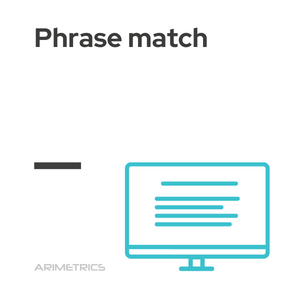
Definition:
On paid platforms such as Google Ads and Microsoft Advertising, phrase matching is a keyword setting that allows an ad to be triggered when a user’s search query includes a specific phrase in the same order. This option provides a balance between exact match and broad match, allowing some flexibility while maintaining control over search relevance.
Examples of phrase matching
To illustrate how phrase matching works, let’s consider an ad group with the keyword“golf clubs“. The ad can be triggered in the following situations:
- The user’s search is “golf clubs“, exactly matching the phrase.
- The search contains the phrase with additional words before or after it, such as“buy golf clubs“,“choose golf clubs“, or“golf club store“.
- It will not activate if the words in the phrase are in a different order, such as“golf clubs“.
Advantages of using phrase matching
- Increased relevancy: By ensuring that ads are shown only when searches contain the exact phrase, the relevance of the ad to the user is improved.
- Budget optimization: By filtering less relevant searches, the use of the advertising budget is optimized, focusing on queries with higher purchase intent.
- Improved click-through rate (CTR): By targeting more specific searches, ads are likely to achieve a better click-through rate because they are more relevant to the user’s needs.
Phrase matching is a valuable tool for advertisers who want to balance reach and relevance, ensuring that their ads reach the right audience without missing valuable conversion opportunities.
Strategies for using phrase matching
Implementing phrase matching in Google Ads campaigns requires careful planning to maximize its effectiveness. Here are some useful strategies:
- Keyword research: Before setting up phrase matching, it is important to conduct thorough keyword research to identify relevant phrases that users might search for. Tools such as Google’s Keyword Planner can be of great help.
- Combination with other match types: Using phrase matching in conjunction with other matching options, such as exact or broad match, allows for a more flexible and controlled approach to campaigns.
- Ongoing monitoring and adjustment: It is crucial to monitor the performance of phrase-matched keywords and make adjustments as needed. Analyzing CTR, conversions and cost-per-click (CPC) can provide valuable information to optimize campaigns.
Considerations when using phrase matching
Although phrase matching offers several advantages, it is also important to be aware of some aspects to avoid potential problems:
- Competition and cost: Depending on the industry and keywords selected, competition can be high, which can increase the cost per click.
- Ad Relevance: Ensuring that the ad content is relevant to the phrase match keywords is crucial to maintaining a high level of quality.
- Exclusion of negative keywords: To avoid ads being displayed on irrelevant searches, it is advisable to use negative keywords.
Phrase matching is a valuable tool for advertisers who want to balance reach and relevance, ensuring that their ads reach the right audience without missing valuable conversion opportunities.
